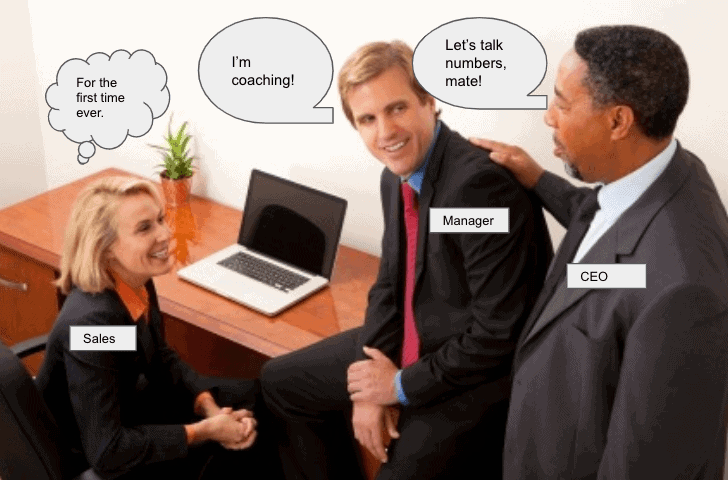TL;DR
Giving up because your environment seems out of control is human, actually, some might not pick up hope once they regain control – a concept coined ‘learned helplessness’ by Martin Seligman. As a solution, Seligman proposes ‘positive psychology’ by i.e. convincing yourself that a bad sales call in crisis times is temporary, specific and external. That is in stark contrast to the concept of ‘extreme ownership’ – owning bad events as a ‘mistake’ of oneself in order to be able to learn from it. I propose a practical middle way between the two: in order to stay in the flow as a sales rep, do exhibit positive thinking, however, tag bad conversation for later to review with a sales manager and then own up to the mistakes made in order to learn from them.
One the one hand: Positive psychology
Optimism is correlated with sales success according to Seligman. They outperformed pessimistic sellers in a study by 37% and the top 10% of optimists vs. top 10% of pessimists even outscored by 88%.
Nevertheless, Seligman found that in low control environments, like the current corona crisis, individuals can give up and not regain hope once normalcy returns – ‘learned helplessness’.
His solution is called ‘positive psychology’ and is applied by David H. Pink in ‘To Sell is Human’ as follows:
When something bad occurs (i.e. bad call), ask yourself three questions—and come up with an intelligent way to answer each one “no”:
1. Is this permanent?
Answer: No, I was flat today cause I didn’t get much sleep.
2. Is this pervasive?
Answer: No, just this particular guy was a jerk
3. Is this personal?
Answer: No, I could have been sharper, but the real reason he passed was that he wasn’t ready to buy yet.
The more you explain bad events as temporary, specific, and external, the more likely you are to persist even in the face of adversity.
On the other hand: Extreme Ownership
Jocko Willink, a former Navy Seal, wrote the (imo) best book on leadership, called Extreme Ownership. I would have gone for a less excessive title, but so be it.
The main premise is: without fully owning everything that happens around you, you will never be able to learn from mistakes that happen.
An example, you are a sales manager and a sales rep is forced to heavily discount your product because he stated the price too early in the sales process – It’s your fault as a sales manager, as you clearly didn’t train him enough on the topic.
The issue
Let’s take a more current example, you are a sales rep and a callee goes off on you saying ‘you stupid sales monkey, show some sensitivity in these times’. Under positive psychology, you should push the call away from you and just say it wasn’t your fault and the guy was a jerk. Extreme ownership demands that you also own up here: something triggered the callee, what was it? Did you do sufficient pre-call research? Is your script appropriate etc.
On the one hand, we can sustain momentum, make more calls, and not dwell on the bad experience, but we probably will not learn. On the other hand, we stop, reflect, adjust & learn, but probably lose our ‘flow’.
Let’s call it: the dichotomy of reacting to bad events. I’d argue it's impossible to have both at the same time.

The Solution
We must point towards ourselves when things go south – as it is the only thing that we can control. Nevertheless, sales is not only quality but also a quantity game – so we must also keep going and not start to feel discouraged, which would also influence calls negatively as others will feel that.
What I propose is simple. Stick to positive psychology when you're in action mode aka. banging out calls, but don’t forget to mark bad conversations for later in order to discuss them with your manager. As a manager, we must let sales reps revisit the key parts of a call that we see as crucial for the bad outcome and let sales reps identify their weaknesses by themselves. Use call recording software of your VOIP or sophisticated software like chorus.ai or gong to do that.




